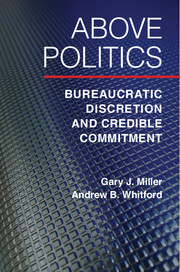Book contents
- Frontmatter
- Contents
- Preface
- Acknowledgments
- 1 Introduction
- 2 The Moral Hazard of Bureaucrats and Politicians
- 3 Political Moral Hazard and Credible Commitment
- 4 Political Moral Hazard and Bureaucratic Autonomy
- 5 “Above Politics”: The Separation of Powers and Bureaucratic Autonomy
- 6 The Control Paradox, Trust, and Leadership
- 7 Professionalism and Credible Commitment
- 8 The Politicization of Financial Regulation
- 9 The Financial Crisis and Reregulation
- 10 Conclusion: The Unraveling of Dodd-Frank
- Works Cited
- Index
- Other books in the series (Series List Continued from page ii)
10 - Conclusion: The Unraveling of Dodd-Frank
Published online by Cambridge University Press: 05 May 2016
- Frontmatter
- Contents
- Preface
- Acknowledgments
- 1 Introduction
- 2 The Moral Hazard of Bureaucrats and Politicians
- 3 Political Moral Hazard and Credible Commitment
- 4 Political Moral Hazard and Bureaucratic Autonomy
- 5 “Above Politics”: The Separation of Powers and Bureaucratic Autonomy
- 6 The Control Paradox, Trust, and Leadership
- 7 Professionalism and Credible Commitment
- 8 The Politicization of Financial Regulation
- 9 The Financial Crisis and Reregulation
- 10 Conclusion: The Unraveling of Dodd-Frank
- Works Cited
- Index
- Other books in the series (Series List Continued from page ii)
Summary
Dodd-Frank is full of imperfections – “no bill is ever perfect,” as Senator Dodd put it. Its principal authors revealed their own imperfections as they steered their versions of regulatory reform toward final passage. Their huge “piece of legislation”…will have unintended consequences – every big bill does. The effects of many of its provisions won't be known until regulatory agencies write and apply “rules” under which they will enforce the law. Those rules will be challenged in court and altered in practice. Eventually Dodd-Frank will be amended by additional legislation. Only the next big financial crisis will fully test the new law, if it remains in effect when that crisis arrives. In Washington, nothing is forever, no argument is ever finally resolved.
– Kaiser (2013, xviii)Section 716 of Dodd-Frank prohibited federal government bailouts of financial entities involved in the business of credit default “swaps.” These were the complex instruments that in 2002 investor Warren Buffett had presaged as being “financial weapons of mass destruction, carrying dangers that, while now latent, are potentially lethal” (Berkshire Hathaway Inc., 2002, 15). Swaps involving complex arrangements were often the main problem in the crises engulfing so many financial entities during this time period. AIG, for instance, guaranteed the coverage of losses for many banks or funds that had invested in mortgage-backed securities, often of the subprime variant.
As Kaiser notes about the negotiations over Section 716, “regulating derivatives in some fashion was part of the broad consensus on the need for regulatory reform” (Kaiser, 2013, 169). But certain financial institutions challenged the “broad consensus” on regulatory reform and sought to weaken Section 716 in particular, so that they could take higher risks with federal funds covering those risks.
The debates over Section 716 were especially divisive, often pitting representatives from the same party against one another. The stakes had everything to do with all of those bailouts of the large firms, because the problem was how to cordon off risk in banks to ensure that there was no federal backstop for this highly risky market segment. Many considered one early position, pushed by Senator Blanche Lincoln, the new chairman of the Senate Agriculture Committee, to be too soft on derivatives.
- Type
- Chapter
- Information
- Above PoliticsBureaucratic Discretion and Credible Commitment, pp. 220 - 238Publisher: Cambridge University PressPrint publication year: 2016

